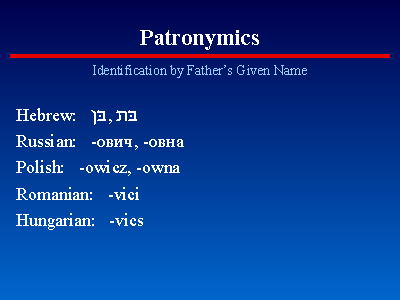
|

|
Names written in Polish or Russian (or any other Eastern European) civil records often can be confusing; they typically are not spelled as the genealogist might expect.
Before the 19th century, most Jews did not have hereditary
family surnames.
Patronymics (father's given names) were used instead.
Patronymics typically appeared with the Russian suffix
"-вич" -vich (in Polish: -wicz)
for a male
For example, in Polish, “Abram Leizorowicz Rozenbaum” means “Abram, son of Leizor, surname Rozenbaum”. In Hebrew, the same person might write their name as “Abram ben Leizor” (Abram, son of Leizor).